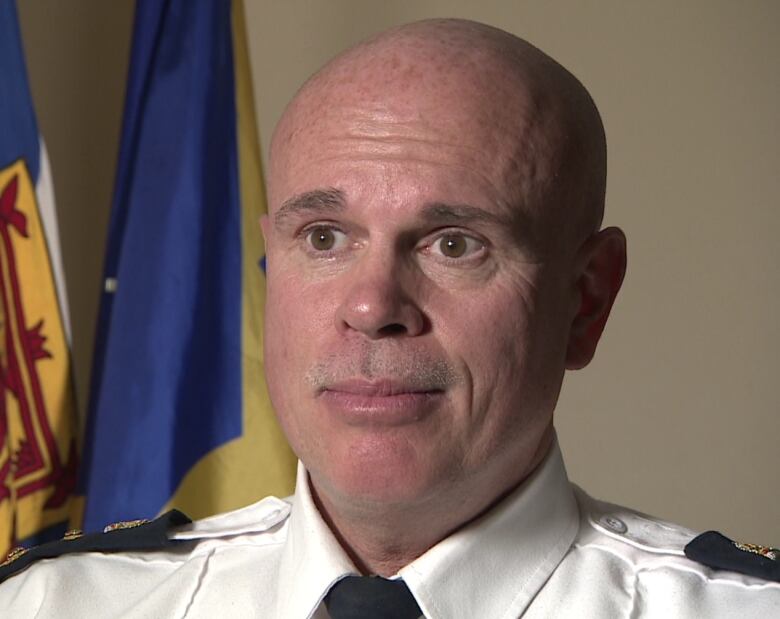Halifax police chief recalls finding RCMP officer in Haiti earthquake
'It still affects me,' says Halifax Police Chief Jean-Michel Blais of the friends he lost in Haiti
The earthquake in Haiti still haunts Halifax Regional Police Chief Jean-Michel Blais, who helped the effort to recover the bodies of two RCMP officers in January 2010.
"It still affects me. I still think of them on occasion, and it's something I'm going to have to live with for the rest of my life," Blais told Radio-Canada Acadie.
Recently, Blais shared that he was diagnosed with PTSD in January 2012, according to HRP. The diagnosis came two years after his third trip to the country.
Blais worked in the Caribbean country, first in 1995 with the United Nations and returning again in 2008.
His third trip, in 2010, was to help with the devastating outcome of the earthquake that destroyed much of the capital city, Port-au-Prince.
In that earthquake, more than 230,000 people died. Blais helped search rubble for missing officers and people he worked alongside when he was stationed in the city.
Searching for friends and colleagues
"Several people I dug up — helped to dig up — and carried out of the ruins of the UN headquarters were good friends and colleagues of mine," Blais said.
And the country "full of life, full of joy" that Blais once knew, seemed lost.
"It was akin to what you see on the TV show The Walking Dead, where you have these people who are walking around aimlessly in a permanent state of shock," he said.
"Many weren't physically injured, but you could see internally they were all injured psychologically, scarred by what they'd gone through."

Around him were "bodies in the street," and "the putrid smell of death," worsening with the heat, Blais said.
"That joy and that life — that vitality — just wasn't there."
Among the casualties were two Canadian RCMP officers.
Sgt. Mark Gallagher had just arrived in Haiti after spending Christmas in the Maritimes. Previously a media relations officer in Halifax, he was part of a United Nations mission training police officers in Haiti.
Gallagher, whom Blais did not know personally, was found by France's Grand Armée officers in the remains of Blais' old apartment building.
Coates recognized by his boot laces
The other officer, Chief Supt. Doug Coates, lived in Gatineau and worked in Ottawa. He was the most senior RCMP officer in Haiti, and the one who posted Blais to Haiti in 2008.
"Doug, I knew very well," Blais said. "He was a wonderful colleague."
Coates was at a meeting Jan. 12, 2010, in the United Nations building. His conference room was the only one with carpeting, Blais said.
"When a building such as that collapses, the carpeting is no long carpeting. It's turned into dust," Blais said, and that hampered their search. "After 32 hours, we started finding bodies."
Around hour 40, Blais says he saw a boot.
"The boot was attached to a foot," Blais said. "I knew that, strange enough, Doug Coates would tie his boots in a very unique manner, and it was that point I was pretty certain we had Doug."
'The most emotionally challenging ride'
Blais carried his friend's body out with four search and rescue technicians from China, and stayed with him.

He drove Coates' remains across the devastated city to the temporary United Nations headquarters and was close by on the way back to Canada.
"I was seated in Doug's funeral coach and went along the Highway of Heroes for the most emotionally challenging ride of my life," Blais said.
A team with Radio-Canada Acadie, producer Paul Émile d'Entremont, reporter Nicolas Steinbach and cameraman Pierre Fournier, travelled to Haiti in March 2015. The crew spoke to Blais in Halifax.
The crew travelled to a school that has since been built in Port-au-Prince in memory of Gallagher, an "absolutely critical contribution," Blais said.
He hopes Canadians continue to help in Haiti with education to make a lasting cultural change, he said.
"Haiti's hopes are humanity's hopes, because it's not just in Haiti where there are challenges. We just have to take a look on our First Nation reserves," he said.
"If we be insular and decide not to help people, than they would have died in vain," Blais said.
With files from Paul Emile D'Entremont
